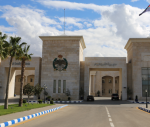You are here
It’s time to rethink philanthropy in Jordan
Feb 06,2022 - Last updated at Feb 06,2022
The latest economic projections by the World Bank and others expect a deceleration of economic growth globally, Jordan included. While the pandemic is mentioned as the major underlying factor, in the case of Jordan the International Monetary Fund adds the high public debt that limits the government’s ability to invest in infrastructure and human capital development and expand social protection as another reason. Finally, a return to the international pre-pandemic levels of tourism is not expected to materialise before 2024, and Jordan may not be an exception to this.
By now, we all know that governments cannot address the triple crisis of the pandemic, the economic slowdown and the rise in debt alone. There are too many fires to be put out and budgets have a short annual shelf life, even if no other crises crop up in the meantime. We need alternative ways of thinking about public finance in general and, in particular, how to exploit synergies between alternative modes of financing that can support development and offer protection to ordinary citizens.
It is time to rethink the role and impact of philanthropy. This rethinking is not about whether philanthropy can reduce the pressure on public finance or replace public social services. It is about how philanthropy can strategically partner with government to address the development challengesthat many countries face.
Philanthropy is not wishful thinking and we have practical examples here in Jordan. For example, during the lockdowns over the past two years we witnessed a commendable degree of social solidarity and support for common causes. There were contributions to government from private sector through the Himet WatanFund. Civil society organisations and organised volunteers, tried their utmost to function effectively and extend assistance to the vulnerable.And a great, albeit unknown, number of ordinary citizens discreetly helped others who had greater needs than themselves.
I do believe that Jordanians, inside and outside Jordan, are philanthropists at heart.I cannot do justice to the plethora of generous examples. However, we need to go beyond the three traditional forms philanthropy has taken so far: First, donations which are limited to one time transfers — like many we are witnessing today. Second, contributing to tangible assets (schools, mosques, universities). And, third, supporting families and individuals in need through cash donations, food parcels, medical assistance and scholarships either directly or through NGOs.
Moving forward we can use the lessons from the international literature: The synergies are enhanced and the impact is greater when government and philanthropists establish a symbiotic relationship, jointly explore solutions though open dialogue and act together thus “making the total greater than the sum of the parts”.
We are already witnessing such a trend in Jordan whereby some family or company foundations are taking an institutional and developmental approach towards their role as philanthropists. And not only that: There have been an increasing number of youth initiatives based onvolunteerism.
Indeed we are living in a changing world.For example, a poll of 28 high income and developing countries conducted by the Edelman Trust Barometer in 2022 revealed that citizens’ trust in NGOs has risen to nearly 60 per cent among respondents since before the onset of the pandemic. Their trust in businesses remained stable but trust in governments declined to 52 per cent (a significant 20 per cent decrease) reaching a low of 50 per cent for social media.Countries should not fail to capitalise on citizens’ and businesses’ initiatives and the role they can play: It is much easier to implement even difficult choices when there is trust.
In conclusion, there are several issues to be re-assessed so countries can better navigate through the triple crisis that includes the rise in public debt that has admittedly been at least in part due to measures aiming to save lives and livelihoods. The legal framework should ensure that charitable entities can register and operate easily andin a way that builds upon trust among all stakeholders.The mechanism for approving funding from international donors should be simplified in a way that ensures continuity and avoid delays.Decisions and actions should be taken though dialogue and in collaboration with all concerned parties. All in all, it is time to reconsider philanthropy,open the communication channels and shift the mindset for the benefit of all.
The author is former minister of planning and international cooperation and former director at the International Labour Organisation













